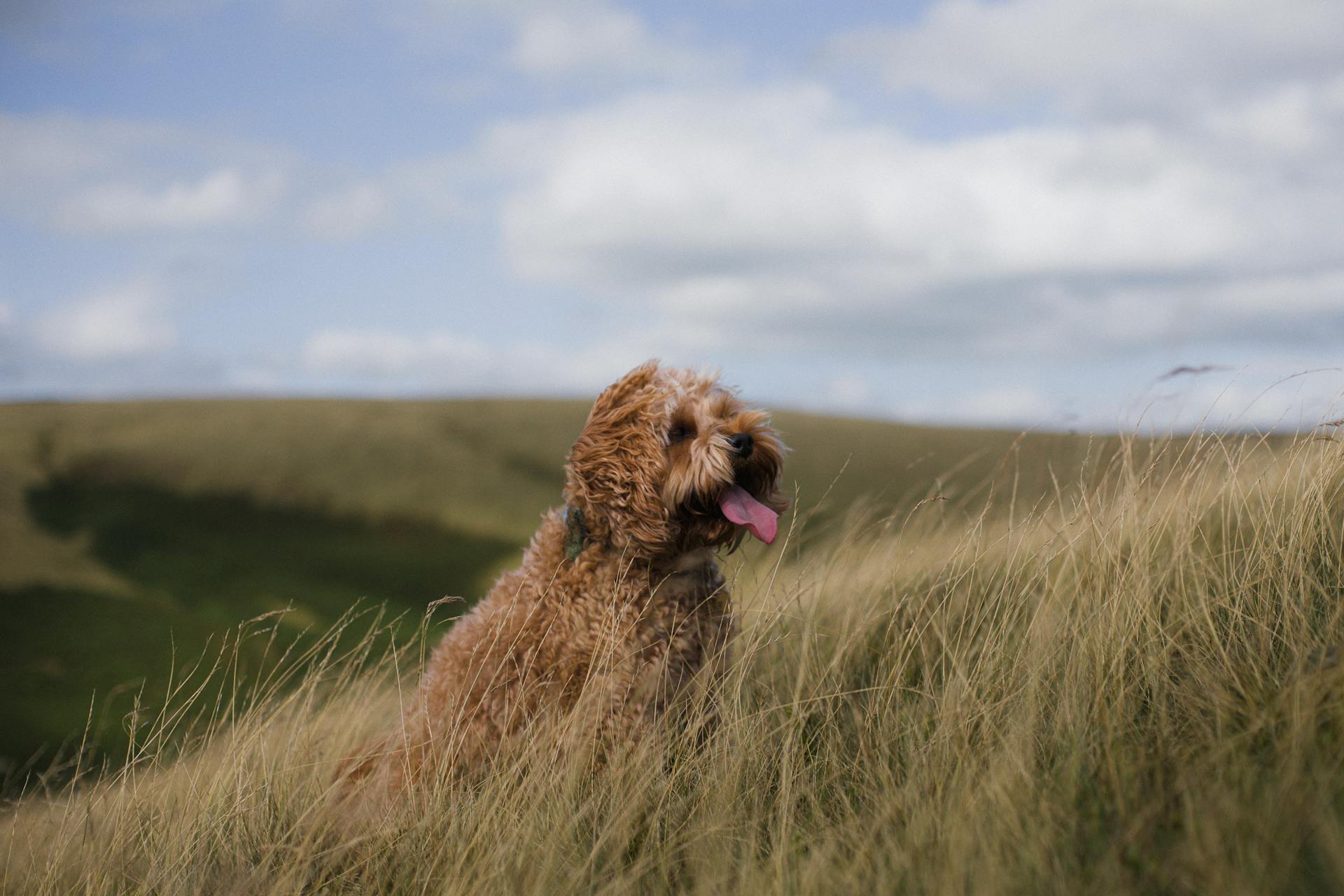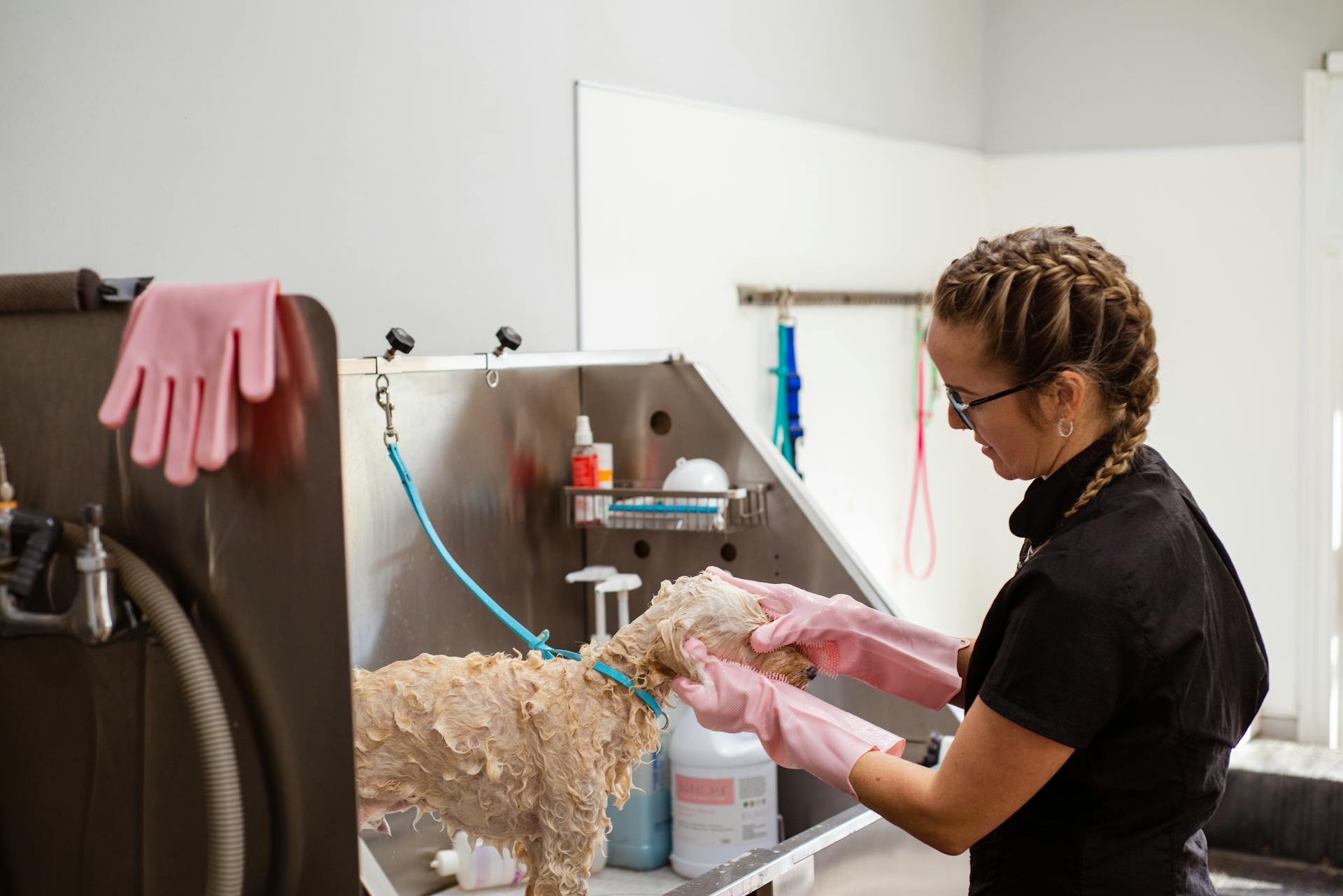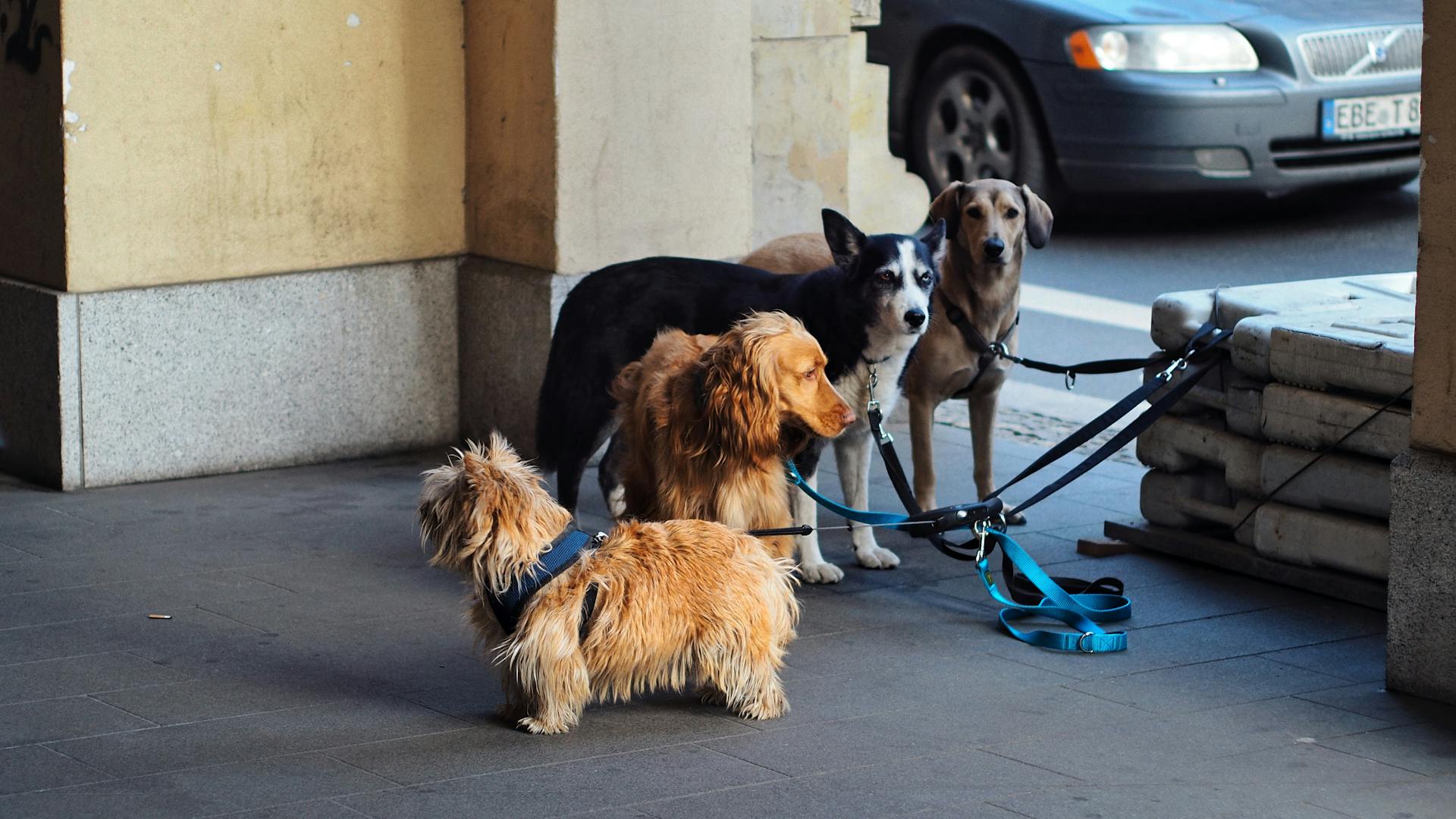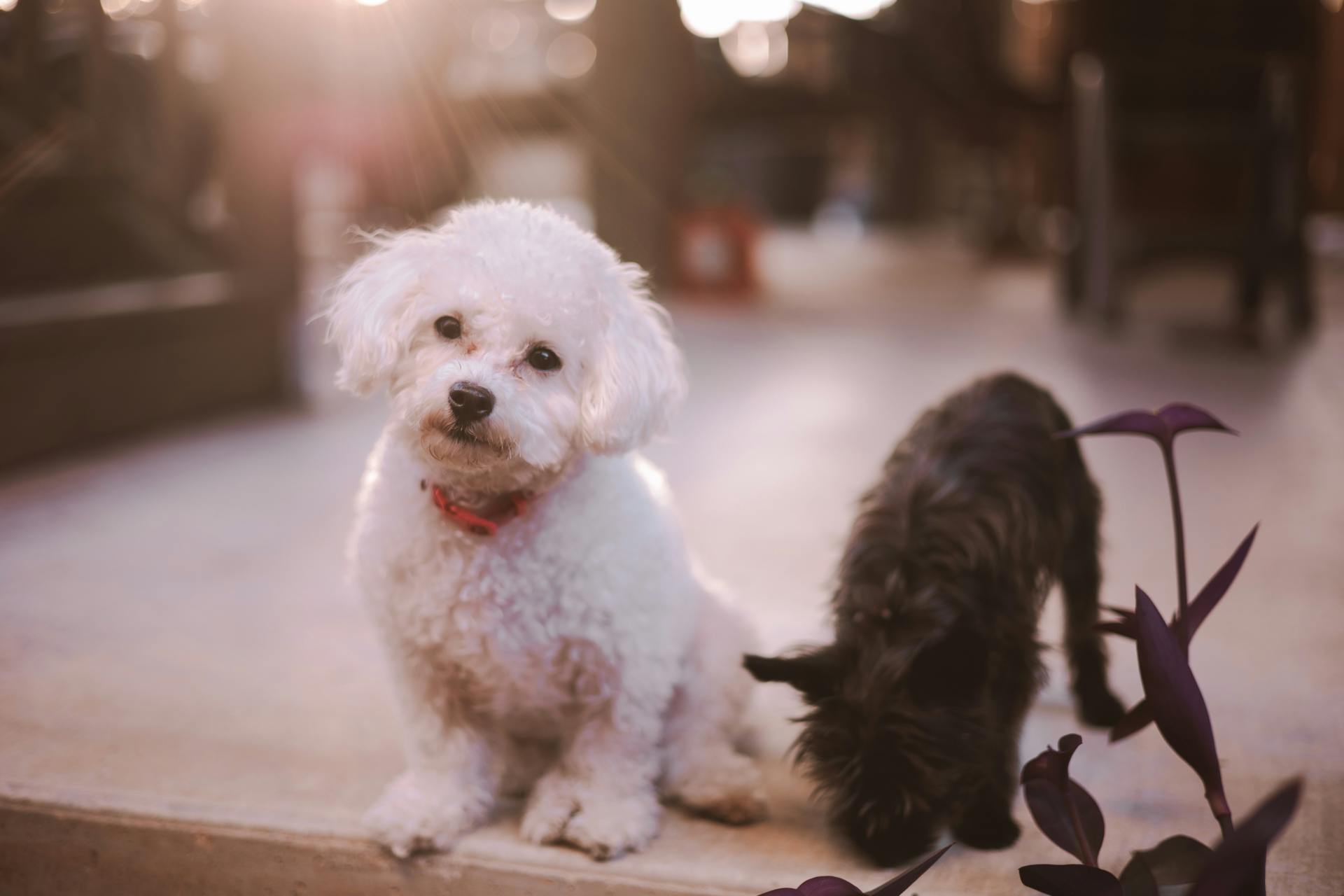
Giving your dog a flea bath can be a daunting task, but it's essential for their health and comfort. Fleas can cause skin irritation, allergic reactions, and even transmit diseases like tapeworms.
Fleas can lay up to 50 eggs per day, which can quickly infest your home and yard. This is why it's crucial to act fast and give your dog a flea bath as soon as possible.
Before you start, make sure you have all the necessary supplies, including a flea shampoo, towels, and a flea comb. A flea comb can help remove fleas and their eggs from your dog's coat, especially in areas where they tend to congregate, such as the neck, tail, and belly.
The American Heartworm Society recommends using a flea shampoo that contains an ingredient like pyrethrin or rotenone, which can help kill adult fleas and prevent new ones from hatching.
Curious to learn more? Check out: Does Dog Flea Shampoo Work
Preparation
To give your dog a flea bath, you'll need to prepare a few things first. You'll need a water source, such as a faucet in a tub or sink, or a hose if you're bathing outdoors.
Additional reading: Does My Dog Need Flea and Tick Medicine Year round
A tub or basin is also necessary, unless you're bathing outside. You'll need plenty of towels, depending on the size of your dog. A leash or collar, or a slip leash, will come in handy to keep your dog secure.
You'll need flea shampoo, which should be specifically labeled for dogs. If you have a puppy, make sure the shampoo is suitable for young dogs. Check the ingredients to ensure there are no allergens. Look for unbiased reviews to see how well the shampoo has worked for others.
Eye protection is crucial during a flea bath, so get some basic eye lubricant ointment or mineral oil to put in your dog's eyes. This will help protect them from the harsh chemicals in the flea shampoo.
You might also want to wear gloves to protect your hands from the chemicals, which can cause drying or irritation.
Here's a checklist of the things you'll need:
- Water source (faucet in tub/sink or hose)
- Tub or basin
- Towels
- Leash/collar or slip leash
- Flea shampoo
- Eye lubricant or mineral oil
- Gloves (optional)
Identifying Infestation
You can usually notice the symptoms of a flea infestation before you spot any fleas.
Inflammation of the skin, tiny red dots on the skin, intense itching around the shoulder and neck area, restlessness, hair loss, and scabbing on the skin are all common signs of a flea infestation.
One key sign of a flea infestation is flea dropping, which resembles black pepper and turns into a red color when wet due to the digested blood.
To check for flea infestation, look for "flea dirt" in your dog's fur, particularly in their armpits and around their groin area. This is flea poo that looks like black or dark brown specs.
If you suspect flea dirt, put it on a wet tissue and check if it leaves a rusty red stain.
Additional reading: Dog Flea Dirt
Infestation Signs
You'll usually notice the symptoms of a flea infestation before you spot any fleas. These symptoms can be quite uncomfortable for your pet.
For more insights, see: What Does Flea Infestation Look like on a Dog
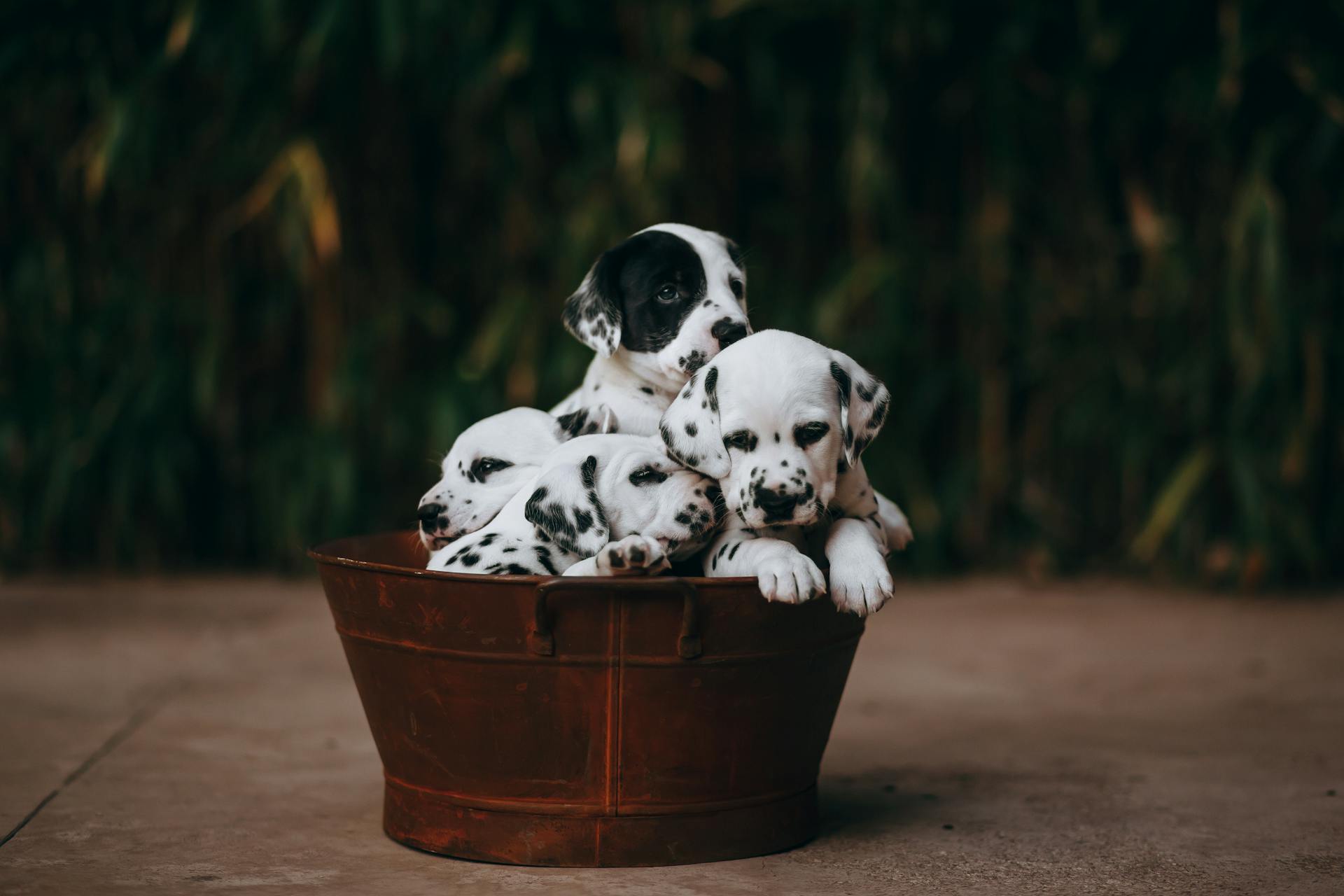
Inflammation of the skin is a common sign of flea infestation. Tiny red dots on the skin can also be a giveaway.
Intense itching around the shoulder and neck area is a classic symptom. Restlessness is another sign that your pet might be dealing with fleas.
Hair loss can occur due to excessive scratching. Scabbing on the skin is another potential sign.
Flea dirt, which looks like black pepper, can be a sign of flea infestation. You can check for it by running a comb through your pet's hair.
Here are some common signs of flea infestation to look out for:
- Inflammation of the skin
- Tiny red dots on the skin
- Intense itching around the shoulder and neck area
- Restlessness
- Hair loss
- Scabbing on the skin
- Flea dirt (black pepper-like specks)
The Life Cycle
Adult fleas only live for a few days to two weeks, but their life cycle is much longer.
Fleas lay eggs on your pet after feeding on blood, and these eggs fall off all around your home.
It takes about 1–10 days for the eggs to hatch into larvae, which feed on flea waste products.
The larvae spin themselves a cocoon or pupa to mature in, a process that can take weeks or even months.
The warmer the environment, the quicker the larvae will emerge as adult fleas.
The full life cycle can be several months long, making it a persistent problem to tackle.
To break the life cycle, you need to continuously treat your pet for several months.
For your interest: Can You See Flea Eggs on a Dog
Calm Before
Before starting the flea bath, it's essential to calm your dog down. Consider giving a CBD treat to your furry friend before the bath to associate the experience with positive rewards.
You should never shove your dog into the water, as it can be traumatizing and cause them to avoid future baths. Wetting your dog slowly is also crucial to prevent startling them.
Giving your dog a bit of reassurance is vital during this process. Provide constant praise as you bathe your dog, and they'll look to you for comfort.
If your dog has a toy that can get wet, add it to the bathtub to distract them from the bath. This can help take their mind off the experience and make the process smoother.
Intriguing read: Yorkshire Terrier Giving Birth
Homemade Shampoo
To make a homemade dog shampoo, you'll need to start by wetting your dog's fur. The amount of shampoo you use will depend on the size of your dog, with 3-5 tablespoons being a good starting point for small dogs.
You can use a variety of ingredients, but one popular option is ZOTE soap from Mexico, which has Coconut Oil and Citronella Oil that help kill fleas and soothe skin. This soap is mild and effective, and can even help whiten tear stains around white dogs' eyes.
After applying the shampoo, let it sit for 3-5 minutes, and use this time to massage your dog and keep them calm. You can also use this time to comb out any dead fleas that may be stuck in their hair.
To rinse your dog, make sure to get all the soap out of their fur, and if there are any dead fleas, rinse them down the drain. You may need to use a comb to remove any stuck fleas.
Here are some tips for making homemade flea shampoo:
- Use a mild soap like ZOTE
- Add ingredients like Coconut Oil and Citronella Oil for their flea-killing and skin-soothing properties
- Massage your dog during the waiting time to keep them calm
- Rinse thoroughly to remove all soap and dead fleas
Safe Shampooing
Regular grooming is key to detecting and removing fleas before they cause an infestation. If you don't already have a flea comb, get one to keep handy in case you need it.
Using a flea shampoo with neem oil or essential oils like lavender, lemongrass, orange, peppermint, or cedarwood can act as natural flea repellents. Just be aware of the potential dangers and toxicity associated with non-organic or detergent-based products.
Here are some of our favorite natural flea dog shampoos:
- Revitalize Organic Neem Dog Shampoo with Sweet Orange Essential Oil: This shampoo repels pests, promotes collagen production, and reduces inflammation.
- Organic Cedar Dog Shampoo and Conditioner with Peppermint & Eucalyptus: This formulation packs a punch to fleas with its natural pest repellents.
- Organic Lemongrass and Aloe Hypoallergenic Dog Shampoo: This gentle shampoo is effective at getting rid of fleas and is also a safe puppy shampoo.
Safe Shampoo Grooming
Regular grooming is a crucial step in detecting and removing fleas before they cause an infestation. Sometimes, a single flea can cause a dog a lot of discomfort, and a flea comb can be a lifesaver.
A flea comb is a must-have tool for any pet owner. If you don't already have one, get one to keep handy in case you need it.
Mixing a bowl of water with an ounce of 4-Legger dog shampoo can help keep fleas at bay. If you do get a flea on the comb, dip it in the water for a few seconds so it doesn't jump back onto your dog.
Recommended read: How to Keep Fleas off Your Dog in Florida?
Flea shampoos with neem oil or certain essential oils can act as natural flea repellents. However, it's essential to be aware of the potential dangers and toxicity associated with non-organic or detergent-based products.
Here are some of our favorite natural flea dog shampoos that are safe and non-toxic:
Content
Fleas can be a major issue for pets, especially if they're not treated properly. Most cats and dogs will carry fleas at some point in their lives.
To get rid of fleas, you need to break the life cycle. The flea life cycle is a crucial factor in understanding how to eradicate them from your pets and home.
Here are some common types of flea treatments: topical treatments, oral medications, and flea shampoos. Flea shampoos can be an effective way to kill fleas on your pet.
If you're unsure about the type of flea treatment to use, consult with your veterinarian. They can help you determine the best course of action for your pet.
Explore further: Flea Life Cycle Dog
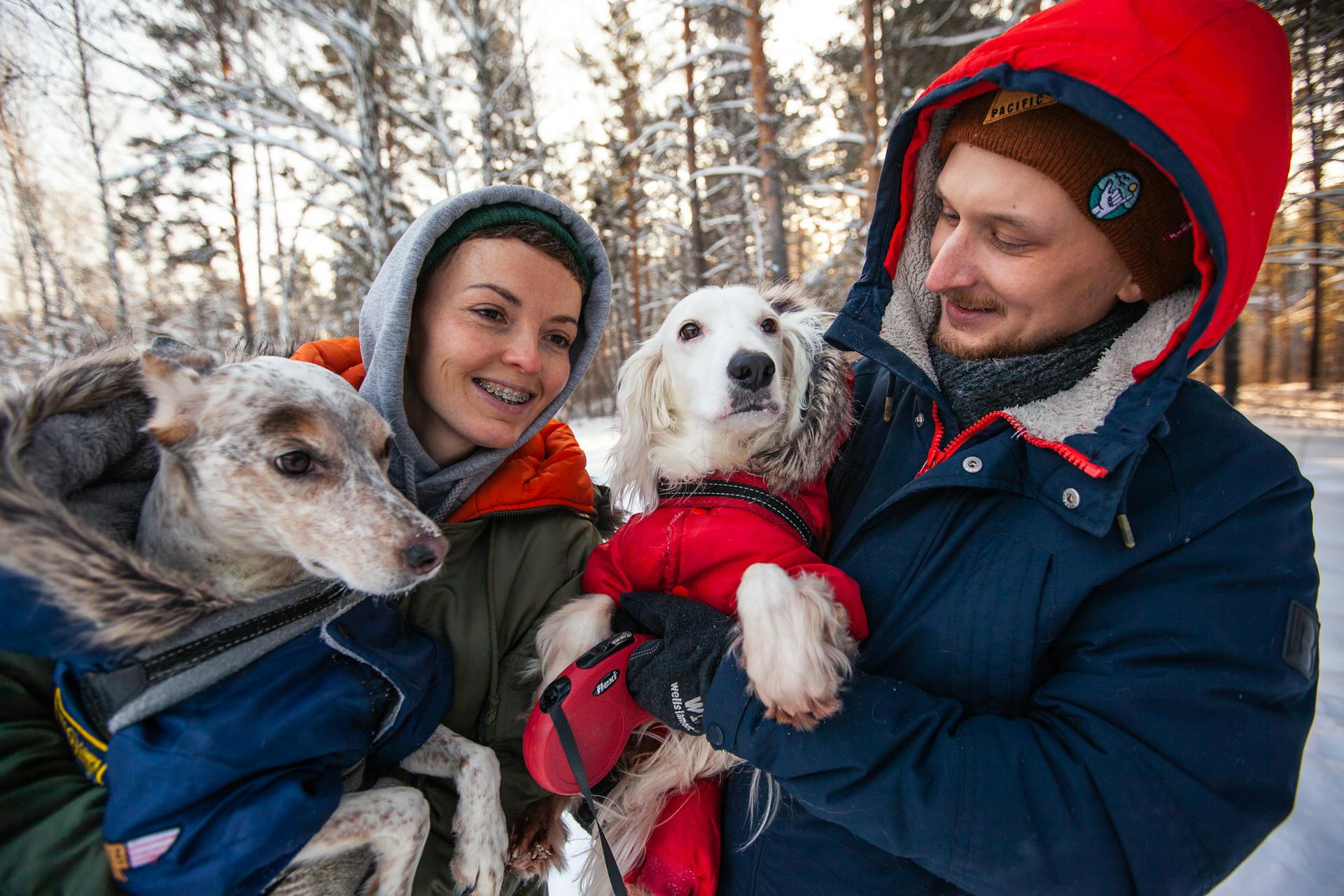
Some flea treatments may not work if the flea infestation is severe. If you're experiencing difficulty getting rid of fleas, consider consulting a pest control professional.
Here are some common signs of a flea infestation:
- Excessive scratching or biting
- Flea dirt or eggs on your pet's coat
- Live fleas on your pet's body
By following these guidelines and tips, you can help keep your pet safe and healthy.
Frequently Asked Questions
Does Dawn dish soap kill fleas on dogs?
Yes, Dawn dish soap can kill fleas on dogs, but it's a temporary solution that doesn't prevent future infestations.
Will bathing a dog remove flea treatment?
Bathing a dog may remove flea treatment, but it's not a guarantee. A salt water bath can help impede fleas without overdosing your dog, but it's essential to follow proper treatment protocols.
How many baths does it take to get rid of fleas?
Flea baths typically need to be repeated every 1-2 weeks to maintain effectiveness. Regular baths can help control flea infestations, but more information is needed to determine the best treatment plan for your dog.
Sources
- https://www.thesprucepets.com/give-your-pet-a-flea-bath-3384828
- https://dope.dog/blogs/dog-health-wellness/giving-your-dog-a-flea-bath-the-ultimate-guide
- https://manypets.com/us/blog/how-to-get-rid-of-fleas-on-dogs/
- https://www.mom4real.com/homemade-pet-shampoo-that-kills-fleas/
- https://www.4-legger.com/blogs/fetch-the-dog-blog/how-to-give-your-dog-a-flea-bath
Featured Images: pexels.com
